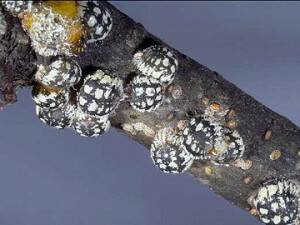 Scale insects are tiny creatures that attach themselves to trees and shrubs. These insects feed on the sap produced by the plant and can cause serious damage to the plant over time, including stunted growth, yellow leaves, and dead branches. As a result of their lack of movement once attached to a plant and their varying size and shape these insects are often misidentified. Ranging from less than 1/16 inch to over 1/4 inch, adult scales resemble narrow fans, oysters, turtles, and barnacles, depending on the type.
Scale insects are tiny creatures that attach themselves to trees and shrubs. These insects feed on the sap produced by the plant and can cause serious damage to the plant over time, including stunted growth, yellow leaves, and dead branches. As a result of their lack of movement once attached to a plant and their varying size and shape these insects are often misidentified. Ranging from less than 1/16 inch to over 1/4 inch, adult scales resemble narrow fans, oysters, turtles, and barnacles, depending on the type.
Generally, scale insects are divided into two types: armored and soft. Common symptoms of armored scales are the yellowing of leaves, premature leaf drop, and limb dieback and cracked bark. Once the tree is infested with Armored Scales there is little to no growth and in some cases the tree can be killed. The primary symptom of soft scales is the presence of honeydew covering the fruit and leaves of the tree and in some cases black mold. These substances attract other insects, such as ants, flies, bees and can cause damage to the tree.
The scale population has several natural enemies in our region, such as ladybugs, and is normally regulated by these predators. However, when the scale population is not well regulated by natural predators there are actions you can take to safeguard your tree from current or future infestations.
Scales are more likely to feed on stressed trees. Maintaining the health and vigor of your trees can help protect against scale infestations; but even the best cared for trees can succumb to an infestation of scales. There are sprays and techniques that can be used now during the growth season but many factors, such as temperature, humidity, and plant sensitivity, need to be considered. To rid your tree of scale without endangering its health it is best to consult with a professional tree care company before any action is taken.


